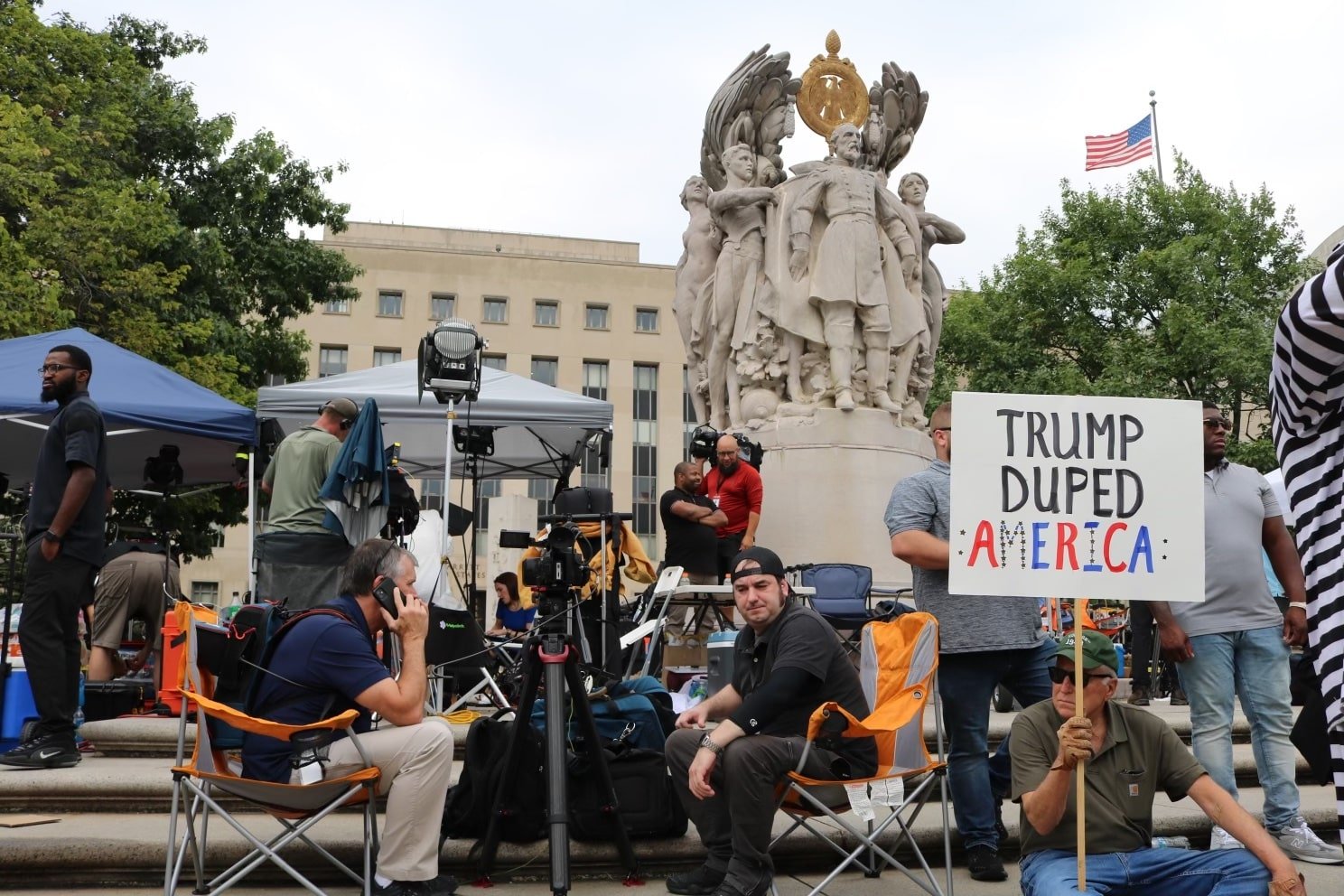WASHINGTON (CN) — Former President Donald Trump was hit with a gag order on Monday over his social media and public statements against potential witnesses and court staff, which a judge said could impact the administration of justice in his 2020 presidential election subversion case.
U.S. District Judge Tanya Chutkan imposed a narrow order against the former president, emphasizing that as a criminal defendant Trump's First Amendment rights are not absolute and can be limited in order to ensure that witnesses and court personnel cannot be intimidated by Trump’s comments and subject to further threats from his supporters. The order also prohibits attacks against both Trump and his legal team as well as the special counsel.
"This is not about whether I like the language Mr. Trump uses, it's about language that presents a danger to the administration of justice," the Barack Obama-appointed judge said as she announced her decision.
The order came after a heated hearing where John Lauro, Trump's lead attorney in Washington, repeatedly painted the order as an attempt by President Joe Biden to censor his likely Republican opponent in the 2024 election.
The special counsel was appointed by the attorney general but operates independently of the Justice Department and the White House, Molly Gaston, an attorney on the special counsel team, clarified.
On Sunday night, Trump in a lengthy attack on Truth Social called special counsel Jack Smith “a leaking, crooked and deranged prosecutor.” He also deemed Biden “crooked;” the prosecutors “hacks and thugs;” and Judge Chutkan “highly partisan.”
“They want to take away my First Amendment rights, and my ability to both campaign and defend myself,” Trump wrote in the post.
Chutkan declined to add restrictions following comments about potential jurors in Washington, finding anyone influenced by those remarks would be filtered out during the jury selection process. She also rejected prosecutors’ request to limit Trump from making comments directed at Biden or the Department of Justice, or calling his prosecution politically motivated.
Trump may still critique his political rivals, like former Vice President Mike Pence, while on the campaign trail but he can't make statements that could interfere with his competitors' testimony, should they be called as government witnesses.
The judge also noted the difference in outcome of targeting public figures like Pence — or others who have drawn Trump’s ire, including former U.S. Attorney General Wiliam Barr and former White House staffer Mark Milley — compared to witnesses with a lower profile, who may be intimidated to the point of chilling their testimony.
Milley, the recently retired chairman of the Joint Chiefs of Staff, was on the receiving end of a Trump attack in which the former president said that during some unidentified historical period, Milley would be executed for communications he had with Chinese officials in the waning months of Trump's presidency to deescalate tensions between the two superpowers.
"This is an act so egregious that, in times gone by, the punishment would have been DEATH! A war between China and the United States could have been the result of this treasonous act," Trump wrote.
In court Monday, Lauro argued Trump was not actively calling for Milley's death, but was merely making clear his disapproval.
Chutkan pushed back: Even if Trump wasn't making a direct threat, his words could encourage his supporters to act. Earlier in the hearing, she referenced a quote attributed to King Henry II of England before the killing of the Archbishop of Canterbury Thomas Becket.
"Will no one rid me of this troublesome priest?" Henry said, which four of his knights interpreted as an order, and took it upon themselves to kill Becket.
Chutkan herself has received racist death threats following social media posts from Trump that accused the judge of bias against him.
Less than two weeks ago, the judge overseeing Trump’s civil fraud trial in New York City hit Trump with a gag order for posting an image of Judge Arthur Engoron’s clerk with Senate Majority Leader Chuck Schumer, baselessly referring to her as the senator’s “girlfriend” to frame the court as biased against him and ripe for dismissal.
Prosecutors made the request just over a month ago on Sept. 15, seeking a “narrowly tailored order” that would restrict the former president from making more inflammatory statements like those he made following his 2020 election defeat that laid the groundwork for a mob of his supporters to violently breach the U.S. Capitol on Jan. 6, 2021, and ultimately his four criminal charges in Washington.
Gaston cited in the motion seven statements by Trump that targeted and named those he felt were responsible for his loss, which consistently led his supporters to make threats against those individuals and their family members.
She also included screenshots of recent post Trump made on Truth Social that prosecutors say are a clear attempt to bolster and denigrate certain likely witnesses in both the public and the jury pool’s eyes. Showered in compliments was former New York City Mayor Rudy Giuliani, Trump’s former attorney and one of the six unnamed co-conspirators in Trump’s indictment, while Trump described former Vice President Mike Pence as “not a very good person.”
In the month since prosecutors requested the gag order, Trump’s legal team has been busy. First, it attempted (but failed) to force Judge Chutkan to recuse herself over allegations she was biased against the ex-president, based on statements she had made in other Jan. 6 sentencing hearings hinting at Trump’s outsized role in the insurrection.
Trump sought in another motion to dismiss the case altogether, arguing the actions for which he was indicted were within his presidential duties and thus should be immune from criminal prosecution. The Oct. 5 motion, if granted, would expand a precedent set by the Supreme Court in a civil suit against President Richard Nixon, finding the chief executive has absolute immunity in civil suits related to acts within the “outer perimeter” of his duties.
The motion is unlikely to succeed before Chutkan or the D.C. Circuit, but may find more support before the Supreme Court, if the justices decide to weigh in. More immediately, the motion could delay a trial in the case, which is currently scheduled to begin March 4, 2024, until after the 2024 presidential election. If he retakes the White House next year, Trump could throw out any prosecution or convictions with a newly appointed Attorney General or his presidential pardoning power.
Subscribe to Closing Arguments
Sign up for new weekly newsletter Closing Arguments to get the latest about ongoing trials, major litigation and hot cases and rulings in courthouses around the U.S. and the world.









